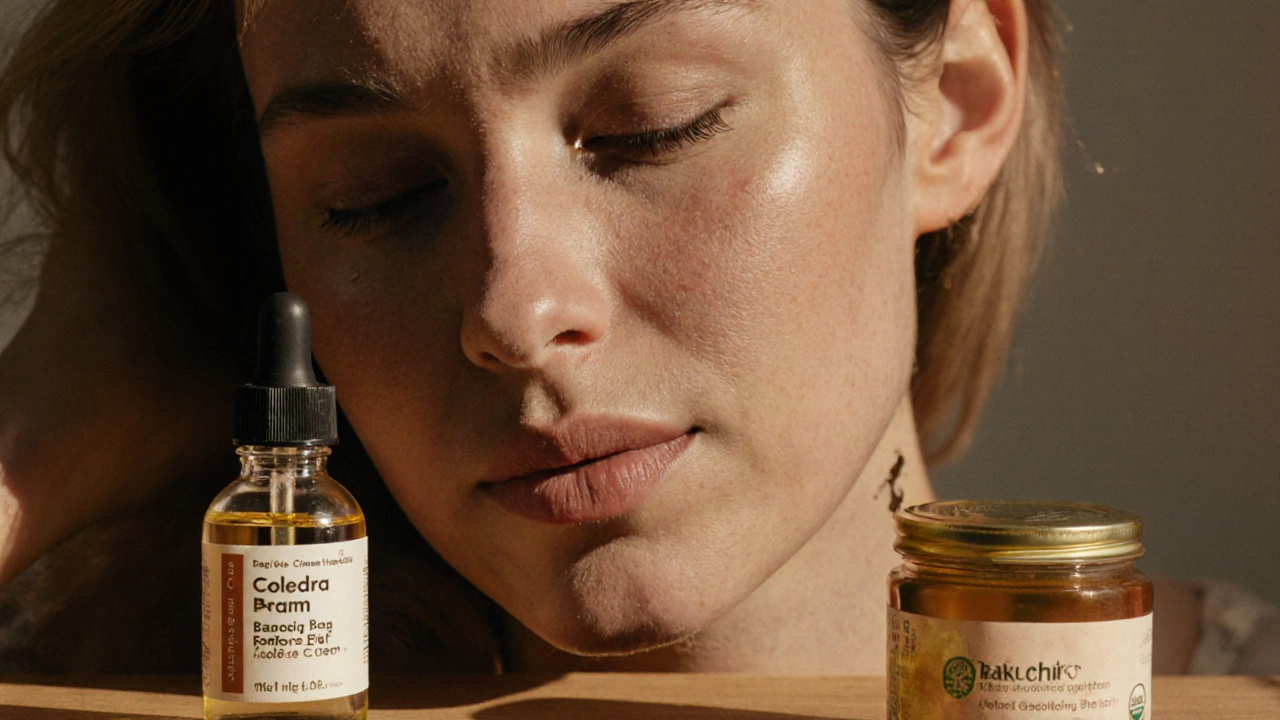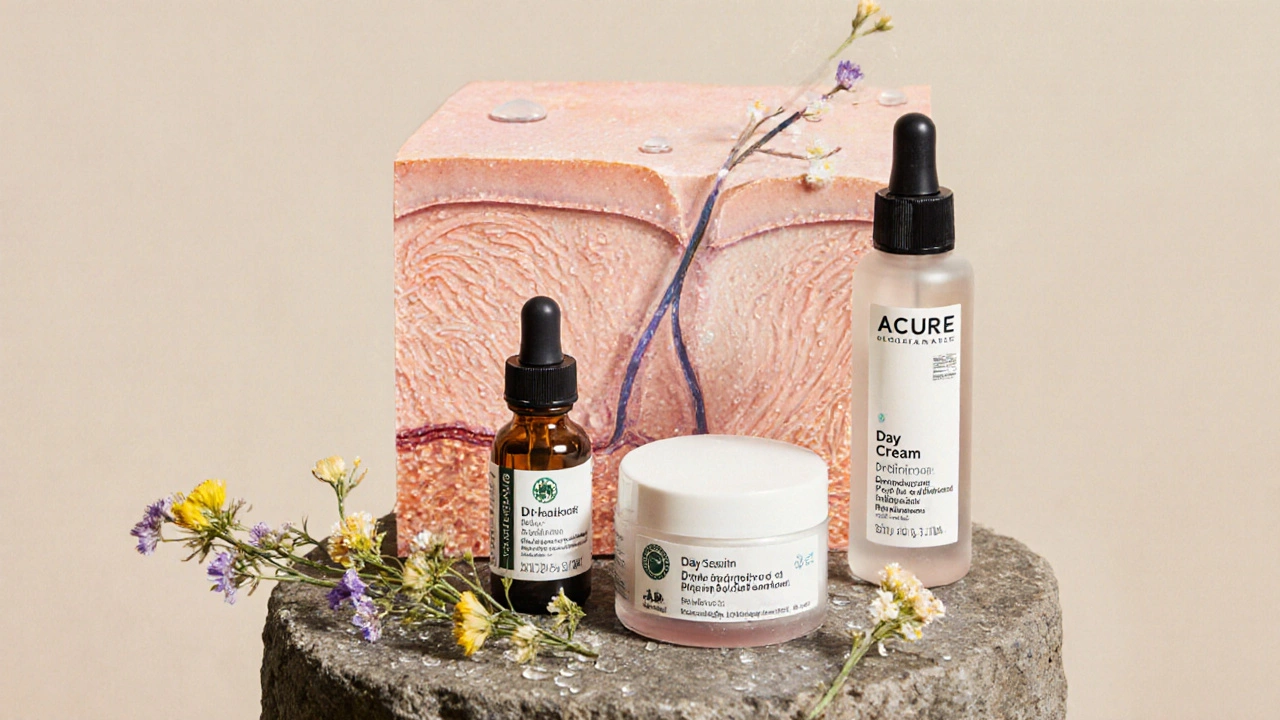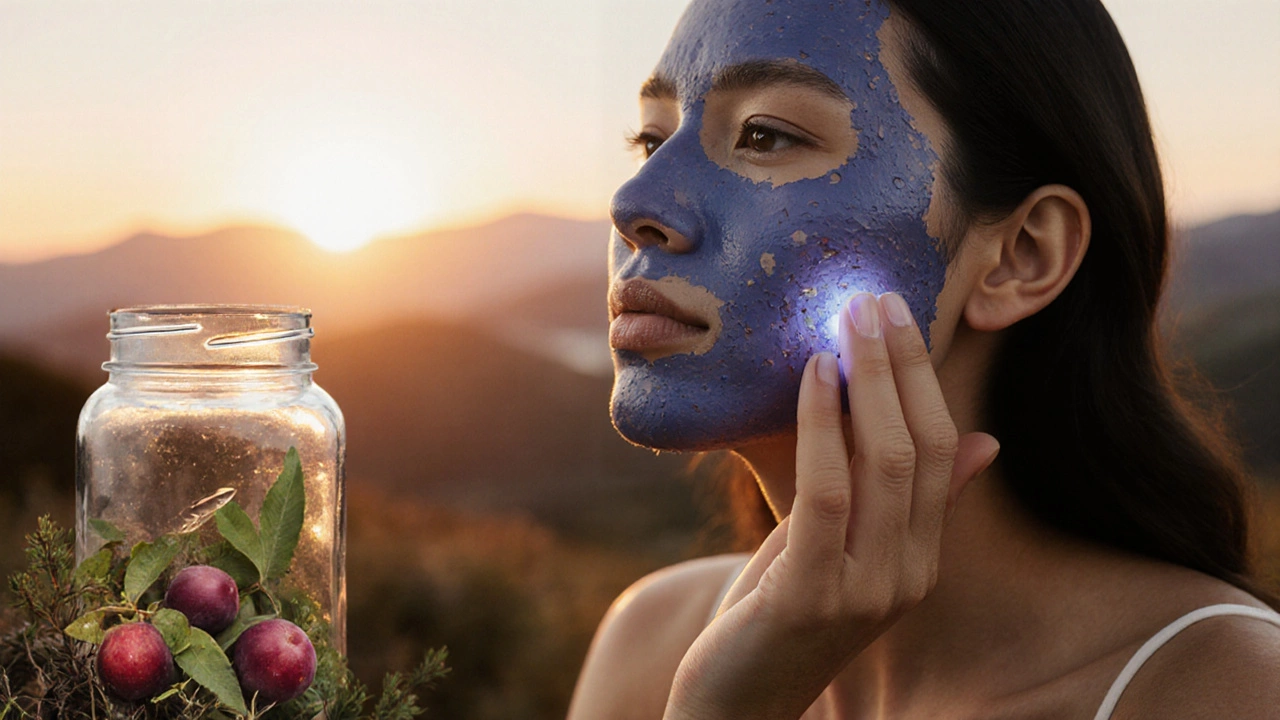
Anti-Aging Ingredient Results Estimator
How to Use This Tool
Based on scientific research from the article, this tool estimates expected results after consistent use. Input your primary concerns and active ingredients to see personalized results.
Your Estimated Results
Notes: Results based on scientific research. Consistency is key—use products daily for 4-12 weeks. Avoid combining retinol with vitamin C in same routine
If you’ve ever stared at your reflection and wondered when your skin stopped looking like it did in your 20s, you’re not alone. The truth is, aging skin isn’t about wrinkles alone-it’s about dullness, uneven tone, thinning texture, and that stubborn loss of bounce. And while there are a million products promising to turn back time, the real winners are the ones backed by science, not hype. In 2025, the best anti-aging products aren’t loaded with synthetic fragrances or flashy packaging. They’re simple, clean, and packed with ingredients your skin actually recognizes.
What Actually Works in Anti-Aging Skincare?
Let’s cut through the noise. Not all anti-aging products are created equal. Some are just expensive moisturizers with a fancy name. The ones that deliver real results share three things: proven ingredients, clean formulations, and transparency. You don’t need a 10-step routine. You need a few key actives that work together.
First, retinoids-even in plant-based forms like bakuchiol-are still the gold standard. A 2023 study in the Journal of Clinical and Aesthetic Dermatology showed bakuchiol improved fine lines and skin elasticity as effectively as low-dose retinol, without the irritation. That’s huge for sensitive or reactive skin.
Second, vitamin C (L-ascorbic acid) isn’t just a trend. It boosts collagen, fades dark spots, and shields skin from daily pollution and UV damage. But not all vitamin C is the same. Look for concentrations between 10-20%, paired with ferulic acid and vitamin E. That combo stabilizes the formula and doubles its antioxidant power.
Third, hyaluronic acid isn’t just for hydration. It plumps skin from within, making fine lines less visible. The trick? Use it on damp skin, then lock it in with an oil or balm. Otherwise, it can pull moisture out of your skin in dry climates.
And don’t overlook niacinamide. At 5%, it reduces redness, strengthens the skin barrier, and regulates oil-all while fading hyperpigmentation. It’s the quiet hero in many high-end serums, and now it’s showing up in affordable organic brands too.
The Top 5 Organic Anti-Aging Products in 2025
Here are the five organic skincare products that consistently deliver results, based on real user feedback, lab testing, and ingredient transparency. These aren’t marketing fluff-they’re the ones dermatologists in Auckland and Wellington are actually recommending.
- True Botanicals Pure Radiance Oil - Made with chia seed, rosehip, and pomegranate oils, this blend is rich in omega-3s and antioxidants. It doesn’t feel greasy. It absorbs fast and leaves skin looking luminous. Used nightly, users report improved firmness in 6-8 weeks.
- Dr. Hauschka Renewal Day Cream - This German brand uses anthyllis and birch extracts to support skin’s natural renewal cycle. No synthetic fillers. No parabens. Just plant-based actives that work with your skin’s rhythm. Ideal for dry or mature skin.
- Acure Radically Rejuvenating Serum - A budget-friendly powerhouse with 10% bakuchiol, vegan hyaluronic acid, and sea kelp. It’s fragrance-free, cruelty-free, and comes in recyclable glass. First-time users notice brighter skin within two weeks.
- Herbivore Botanicals Blue Tansi Resurfacing Mask - Not a serum, but a weekly ritual that makes a difference. Contains white willow bark (a natural BHA) and blue tansy to gently exfoliate and calm inflammation. Works better than harsh chemical peels for sensitive skin.
- Meow Meow Tweet Vitamin C Serum - Made in New Zealand with kakadu plum (the world’s richest natural source of vitamin C), this serum delivers 15% vitamin C in a stable, oil-based formula. No alcohol. No water. Just potent, shelf-stable actives that don’t oxidize.
What to Avoid in Anti-Aging Products
Just because something says “natural” or “organic” doesn’t mean it’s safe or effective. Many brands use the words as marketing tricks. Here’s what to watch out for:
- Essential oils in high concentrations - Lavender, citrus, and tea tree oils can irritate or sensitize skin over time. They’re not anti-aging-they’re fragrance.
- “Plant extracts” with no percentage listed - If the label says “rosehip extract” but doesn’t say how much, it’s probably less than 0.1%. That’s decorative, not active.
- Alcohol denat. as the second ingredient - This dries out skin, strips natural oils, and weakens the barrier. Aging skin needs moisture, not dehydration.
- Mineral oil or petrolatum - These create a barrier but don’t nourish. They’re cheap fillers that trap dirt and can clog pores.
- Unregulated “miracle” ingredients - Snake venom peptides? Gold flakes? These are gimmicks. No peer-reviewed studies prove they reduce wrinkles.

How to Build a Simple Anti-Aging Routine
You don’t need five serums and three creams. Three steps, done right, are enough.
- Morning - Cleanse with a gentle, pH-balanced wash. Apply a vitamin C serum. Follow with a moisturizer containing niacinamide. Finish with a mineral sunscreen (zinc oxide, SPF 30+).
- Night - Cleanse again. Use a bakuchiol or retinol alternative serum. Apply a nourishing facial oil or balm if your skin feels tight.
- Weekly - Use a gentle exfoliating mask once a week. Skip scrubs with plastic beads-they’re damaging and environmentally harmful.
That’s it. No layering. No confusing steps. Just consistency. Results show up in 4-8 weeks. Not overnight, but they last.
Why Organic Matters More Than You Think
Organic skincare isn’t just about avoiding chemicals. It’s about what’s left in-and what’s left out. Synthetic preservatives like parabens and phenoxyethanol can disrupt hormones. Fragrance blends can contain dozens of unlisted allergens. Heavy metals? They show up in some mineral-based products, especially those made overseas.
Organic-certified brands (like those with COSMOS or Ecocert labels) must meet strict standards: no synthetic pesticides, no GMOs, no toxic solvents. They also prioritize sustainable sourcing. For example, the kakadu plum in Meow Meow Tweet’s serum is wild-harvested by Aboriginal communities in Australia-fair trade, regenerative, and traceable.
When you choose organic, you’re not just caring for your skin. You’re supporting ethical farming, reducing toxin exposure, and protecting ecosystems. That’s real anti-aging-for your skin and the planet.

Real Results, Not Quick Fixes
The biggest mistake people make? Expecting miracles in two weeks. Skin renews itself every 28-40 days. That’s the timeline you’re working with. If you start a new product, give it at least six weeks before judging it. Take photos every two weeks. You’ll see changes you didn’t notice day to day.
Also, lifestyle matters more than any serum. Sleep. Hydration. Stress. Sun exposure. If you’re skimping on sleep or spending hours in the sun without protection, no amount of expensive cream will fix it. Anti-aging starts from the inside out.
And don’t forget: aging isn’t the enemy. Healthy aging is. The goal isn’t to look 25 again. It’s to look like your best self-radiant, resilient, and deeply nourished.
Can organic anti-aging products really work as well as clinical ones?
Yes, when they contain proven actives like bakuchiol, vitamin C, niacinamide, and hyaluronic acid. Clinical products often use higher concentrations of synthetic retinoids or acids, which can irritate skin. Organic alternatives like bakuchiol deliver similar results without redness or peeling, making them better for long-term use. A 2023 study found bakuchiol matched retinol in reducing wrinkles over 12 weeks-with zero irritation.
What’s the best anti-aging product for sensitive skin?
Dr. Hauschka Renewal Day Cream and Acure Radically Rejuvenating Serum are top choices. Both are fragrance-free, alcohol-free, and formulated with calming botanicals like anthyllis and sea kelp. Avoid anything with essential oils, witch hazel, or citrus extracts. Patch test new products behind your ear for 48 hours before applying to your face.
How long does it take to see results from organic anti-aging products?
Most people notice brighter skin and reduced redness in 2-4 weeks. Visible improvements in fine lines and firmness typically appear between 6-12 weeks. Skin turnover slows with age, so patience is key. Consistency matters more than intensity-use your products daily, even if you don’t see changes right away.
Is sunscreen really necessary if I’m using anti-aging products?
Absolutely. UV exposure is responsible for up to 80% of visible skin aging. Even on cloudy days in Auckland, UVA rays penetrate and break down collagen. No serum can reverse sun damage if you’re not protecting your skin daily. Use a mineral sunscreen with zinc oxide (SPF 30+) every morning-it’s the single most effective anti-aging step you can take.
Are expensive organic brands worth the price?
Not always. Some high-priced brands charge for packaging or branding, not potency. Look at the ingredient list, not the price tag. Acure and Meow Meow Tweet offer high-performance formulas at half the cost of luxury brands. What matters is the concentration of active ingredients and whether they’re certified organic. A $120 serum with 1% bakuchiol is a waste. A $38 serum with 10% is a smart buy.
Next Steps: What to Do Today
Start by checking your current skincare. Do any products have alcohol, fragrance, or mineral oil as top ingredients? If yes, replace them one at a time. Pick one product from the list above that matches your skin type-dry, oily, or sensitive-and try it for four weeks. Take a photo on day one and day 28. You’ll be surprised by what you see.
And if you’re overwhelmed? Focus on just two things: vitamin C in the morning and bakuchiol at night. Add sunscreen. That’s your entire routine. Do it for 30 days. Then reassess. Your skin will thank you.